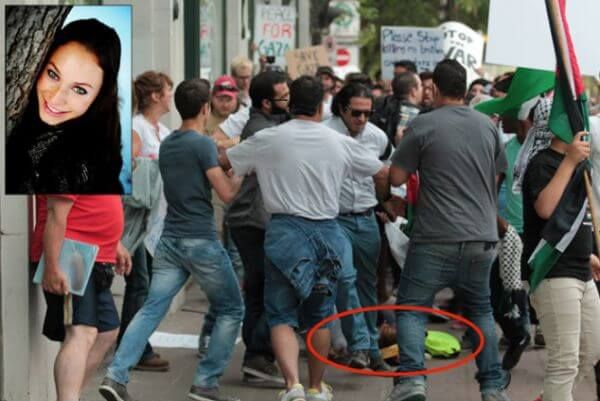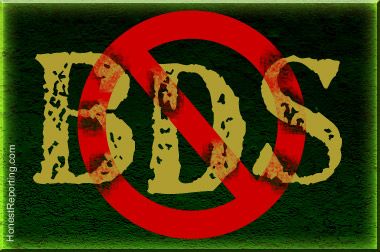Is antisemitism free speech? I have heard antisemitism justified as “freedom of speech” more times than I can count.
Whether it’s an antisemitic cartoon in the New York Times, the hateful rhetoric of BDS (the movement to bring boycotts, divestment and sanctions against Israel), left wing Israel-bashing that crosses the line into Jew-bashing, or right wing neo-Nazism: we hear this same, tired justification.
Some even claim that applying the widely accepted working definition of antisemitism (formulated by the International Holocaust Remembrance Alliance) is a form of “censorship” too.
But is it?
Neo-Nazis in Skokie, Illinois
Often (though not always) antisemitism in America is indeed constitutionally protected free speech.
Of course, if the only justification you can make for your behavior is that it isn’t outright illegal, then you’re setting the bar pretty low.
For example, I was born in Skokie, Illinois (a suburb of Chicago). Skokie came to national attention in the late 1970s for an unfortunate reason: a group of neo-Nazis who called themselves “National Socialists” — a callback to the formal name of Adolf Hitler’s party — announced plans to march. They specifically chose Skokie because it was home to many elderly Holocaust survivors. The Village of Skokie objected, leading to a protracted court battle, in which the American Civil Liberties Union defended the neo-Nazis on the grounds of “free speech.” The Supreme Court eventually ruled in favor of the neo-Nazis, but by then the march had already taken place elsewhere.
But free speech works both ways. Therefore:
- If you’re a Nazi in America, you do indeed have the right to free speech, even if that means traumatizing Holocaust survivors in their own neighborhood. But you’re still a Nazi. And the rest of us have the right to say so. That’s free speech too.
- If you’re an antisemite, you have the right (in most circumstances) to spread your antisemitism. But you’re still an antisemite. And the rest of us have a right to let the world know.
- Defining and calling out antisemitism is free speech. So is encouraging newspapers and social media platforms to behave morally and responsibly in the face of virulent hate.
Antisemites and racists of all stripes don’t like that.
Defamation and incitement are not “free speech”
While the First Amendment protects some significantly distasteful speech (including a Nazi march on American soil) it does not protect all speech.
Libel and slander are both forms of “defamation“: injuring a person’s character or reputation by false and malicious statements. Defamation is almost universally considered a civil offense, and in some jurisdictions it is even a crime.
Typically, defamation law protects only people (i.e. not countries or governments). In some cases defamation law can protect corporations, and in Texas it oddly enough protects the beef industry. However mainstream defamation laws are not limited to individuals. They also protect groups of people, such as a Jewish community. Thus, when “criticism” of Israel crosses the line into antisemitism, as it does disturbingly often, this too can fall within the bounds of defamation.
“Incitement” is the act of persuading someone to commit a crime, such as encouraging violence. Incitement is illegal under U.S. Federal criminal law, as well as in most jurisdictions around the world. “Hate speech” (speech that carries no meaning other than the expression of hatred for some group) is not in itself illegal, but the moment it begins to encourage violence, it becomes like any other form of incitement: an illegal, criminal offense.
Beating up Jews is not ‘free speech’
In 2014, the Hamilton family of Calgary, Alberta Canada, attended an “anti-Israel protest,” to provide an alternate point of view. Present were brother and sister Samantha and Shane, cousin Jacob Birrell, and parents Jim and Marcie.
They carried Israeli flags and attempted to engage in civil conversation. The response of the “protesters” was to beat them up. While variously throwing stones, beating the Hamiltons to the ground and kicking and choking them, the rioters shouted epithets like “dirty Jew.”

The police responded by telling the Hamiltons, “What did you expect was going to happen?” One protester said the Hamiltons had “provoked” the violence by “showing up.”
Months later, after diligent pressure by the Hamiltons to seek justice, one teenager received probation, while several other participants were convicted on charges of assault. In most cases the convicted parties were sentenced to community service as a part of various plea bargains.
This phenomenon of violence disguised as “protest” is disturbingly common.
For example, in 2009 I observed a protest in Chicago, supposedly in “criticism of Israeli policies.” The protesters waved swastikas, burned Israeli flags, marched with papier-mâché effigies of Jewish faces in the classic Nazi Der Sturmer style, and shouted phrases like, “death to Jews.”
It should go without saying, but sadly, it needs to be said:
- These are not “protests,” but riots.
- This is not “criticism of Israel,” but antisemitism.
- Beating or threatening anyone (including Jews) is not “free speech,” but assault.
This dark side to “protests” and “criticism of Israel” is disturbingly under-reported by the media, leading to the mis-impression that these riots are “speech” rather than illegal violence.
BDS not ‘free speech’ either
 The leaders of BDS make clear that their purpose is not peaceful change but the destruction of the world’s only Jewish state, based on a double standard they do not apply to any other country. This squarely fits the international definition of antisemitism.
The leaders of BDS make clear that their purpose is not peaceful change but the destruction of the world’s only Jewish state, based on a double standard they do not apply to any other country. This squarely fits the international definition of antisemitism.
But is this particular incarnation of antisemitism protected by the US Constitution as “free speech”? In a word: no.
A private boycott against a foreign nation is not “free speech” under US law any more than forming a private militia to launch a private war. Just as raising an army is a tool of statecraft — a power reserved exclusively to Congress — so too are other international acts, such as boycotting Israel.
In this sense, boycotts against foreign nations are fundamentally different from the domestic boycotts that are often remembered in connection with the American Civil Rights movement of the 1950s and 60s, such as the Montgomery Bus boycott of 1955. This is the reason for the existence of the U.S. Office of Antiboycott Compliance (OAC), which enforces America’s many antiboycott laws. I previously wrote this technical legal analysis on the topic.
Related reading: Boycotting Israel – Is it Free Speech?
Antisemitism defined
Drawn up by the Berlin-based International Holocaust Remembrance Alliance (“IHRA”) this definition of antisemitism has been adopted and endorsed by a growing number of governments — most recently France.
With the guidance of a coherent definition, lawmakers can devise more nuanced policies, police and prosecutors can more effectively respond to hate crimes, and colleges can more adequately deal with campus antisemitism. Local activists don’t have to flounder with feeble “I know it when I see it” arguments.
The media, too, should be tied down to a clear definition of what’s unacceptably anti-Jewish.
We have analyzed this issue in depth. Would you like to help make a difference? Sign our petition to persuade the media to adopt the IHRA definition.
Because the first step to preventing hate, is to recognize it.
CLICK HERE TO SIGN THE PETITION: IT’S TIME FOR THE MEDIA TO ADOPT THE IHRA DEFINITION OF ANTISEMITISM
Featured image:Vecteezy.com with modifications; Calgary via Canada United With Israel; BDS CC BY-SA HonestReporting;.


